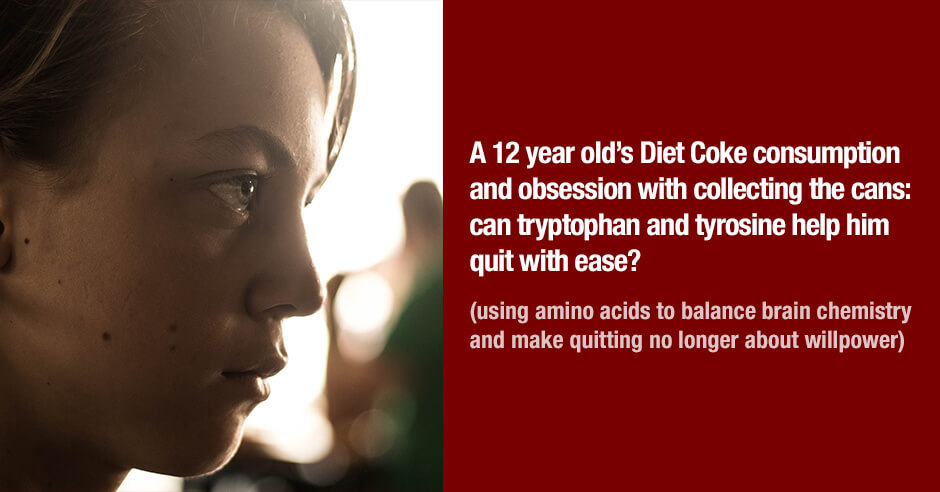
I tried tyrosine yesterday, and Wow! What an amazing effect!
I answered positively to many of the low catecholamines symptoms and I’m also trying to break my coffee addiction – I take espresso shots throughout the day to get through.
So I gave it a try and took 300 mg of tyrosine yesterday at 4pm.
I had more clarity, I could interact with people, I could joke, I started reasoning in a more organized way.
I can’t believe how powerful tyrosine is. Now I finally understand that my brain fog is a result of low dopamine among other neurotransmitters and me drinking that much coffee is just a symptom of low dopamine and I would not need it otherwise.
Today, thanks to tyrosine, I’m better equipped to break this addiction, although I’m a bit scared about a few things before I can use it more spontaneously.
Steve shared this wonderful feedback in a blog comment. I said how happy I was for him and thanked him for sharing.
He also asked a few questions about his sleep being impacted, the chances of getting dependent on tyrosine and concerns for thyroid health. I addressed his questions (read my feedback below) and links for further reading about the catecholamines and using the amino acid tyrosine as a supplement. I also share some tyrosine research, my tyrosine recommendations for quitting coffee, and a key nutritional deficiency to address (low thiamine/vitamin B1).
Tyrosine impacted his sleep (and how to prevent this)
This was the first of his questions:
I could not fall asleep last night because of tyrosine. I was awake 3 hours after my regular bedtime. Maybe because I took it in the afternoon and I drank 2 cups of coffee that morning? Coffee never kept me from sleeping.
There is a simple way to get the benefits of tyrosine and not have it impact your sleep. Tyrosine is best used on waking, mid-morning and only mid-afternoon (no later than 3pm) if sleep is not an issue. If sleep is an issue we start with using it on waking and mid-morning.
I recommend having the bottle of tyrosine beside the bed especially if an espresso shot (likely in Steve’s case) or cup of coffee is needed to get going first thing. Right away it’s helping with the caffeine addiction and offering energy and clarity or focus. It’s also boosting dopamine and improving mood … “I could interact with people, I could joke”.
He could trial just twice a day and then consider another tyrosine no later than 3pm and see how he feels and watch for sleep impacts.
I mentioned to Steve that all this is explained in my book “The Antianxiety Food Solution” which I recommend everyone reads before using amino acids.
One important consideration with high caffeine consumption like this, is a strong possibility of vitamin B1/thiamine deficiency. I share more about this here. Zinc and other B vitamins can become depleted too.
Will the brain adapt and become dependent on tyrosine?
This is a common question I get about the amino acids and Steve was justifiably concerned about it too:
If I’m taking tyrosine to correct low dopamine in my brain, don’t you think that the brain will adapt and will be dependent on tyrosine to create enough dopamine? What is the real cause behind the brain lacking dopamine? I took psychiatric medication in the past and I know they can affect the brain long term; so isn’t it the same about tyrosine?
Using a foreign substance to hijack the brain’s normal working and chemistry and then be dependent on it to produce the right amount?
How will the tyrosine correct this imbalance and help me heal? Do I go back to low levels when I stop it?
There are no concerns about dependence. Tyrosine is addressing low levels of dopamine, one of the catecholamines. It should be a short-term solution when other nutritional imbalances (like low zinc, low vitamin B1 low vitamin B6, low iron etc) are addressed and the dietary changes (all laid out in my book) are implemented too.
Short-term could be a month to 3 months for one-person and up to 6-12 months for someone else. It really depends on the complexity of health issues and other compounding factors (like Steve’s past use of psychiatric medications).
As you can read below, Steve is already gluten-free and dairy-free so this is a great start.
A question about tyrosine and thyroid concerns
I have a history of hypothyroidism in my family and I’m afraid that tyrosine could trigger that for me? I’m healthy now and I eat Gluten/Dairy free
Tyrosine is actually one of the raw materials the thyroid needs and uses for the synthesis of the thyroid hormone thyroxine so there is no issue with it triggering hypothyroidism (an underactive thyroid).
There is, however, an issue with Graves’ disease, an autoimmune disorder that can cause hyperthyroidism (or overactive thyroid). Tyrosine should not be used in this instance. You can read all the amino acid precautions here.
Tyrosine and the research: cognitive performance
Here are some excerpts from this paper: Effect of tyrosine supplementation on clinical and healthy populations under stress or cognitive demands–A review
Consuming the amino-acid tyrosine, the precursor of dopamine and norepinephrine, may counteract decrements in neurotransmitter function and cognitive performance…
Tyrosine does seem to effectively enhance cognitive performance, particularly in short-term stressful and/or cognitively demanding situations.
The conclusion made by the authors is in line with how I recommend using tyrosine i.e. only when “dopamine and/or norepinephrine is temporarily depleted.” This is the same for all amino acids and we use the symptoms questionnaire as a starting point to indicate the possibility of low levels of each of the neurotransmitters.
Tyrosine can also be calming and help with sugar addiction too
As you can see from these blog posts, tyrosine has many applications:
- Tyrosine for alleviating anxiety and panic attacks and creating a feeling of calm focus
- “Potion” of tyrosine, Endorphigen, GABA and tryptophan has been nothing less than a miracle for my depression and anxiety – how long can I remain on these?
- GABA helps 14-year-old with Tourette’s Syndrome (the tics and sleep), and tyrosine makes him happier and his mind sharper
- The individual amino acids glutamine, GABA, tryptophan (or 5-HTP), DPA and tyrosine are powerful for eliminating sugar cravings, often within 5 minutes
And this blog is a good introduction to using tyrosine for improved focus, motivation, energy, a good mood and even for easing anxiety
Additional resources when you are new to using tyrosine and other amino acids as supplements
As always, I use the symptoms questionnaire to figure out if low low dopamine/catecholamines or other neurotransmitter imbalances may be an issue.
If you suspect low levels of any of the neurotransmitters and do not yet have my book, The Antianxiety Food Solution – How the Foods You Eat Can Help You Calm Your Anxious Mind, Improve Your Mood, and End Cravings, I highly recommend getting it and reading it before jumping in and using amino acids on your own so you are knowledgeable. And be sure to share it with the practitioner/health team you or your loved one is working with.
There is an entire chapter on the amino acids and they are discussed throughout the book in the sections on gut health, gluten, blood sugar control (this is covered in an entire chapter too), sugar cravings, anxiety and mood issues.
The book doesn’t include product names (per the publisher’s request) so this blog, The Antianxiety Food Solution Amino Acid and Pyroluria Supplements, lists the amino acids that I use with my individual clients and those in my group programs.
If, after reading this blog and my book, you don’t feel comfortable figuring things out on your own (i.e. doing the symptoms questionnaire and respective amino acids trials), a good place to get help is the GABA QuickStart Program (if you have low GABA symptoms). This is a paid online/virtual group program where you get my guidance and community support.
If you are a practitioner, join us in The Balancing Neurotransmitters: the Fundamentals program. This is also a paid online/virtual program with an opportunity to interact with me and other practitioners who are also using the amino acids.
Wrapping up and your feedback
I appreciate Steve for sharing his success with tyrosine and asking these questions. I do hope this information has been helpful for you and for him too.
Now I’d love to hear from you – does any of this resonate with you? Have you had success like this with tyrosine or experienced other benefits?
If you’re a practitioner is tyrosine one of the amino acids you use with your clients/patients?
Feel free to share and ask your questions below.

